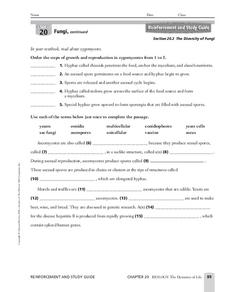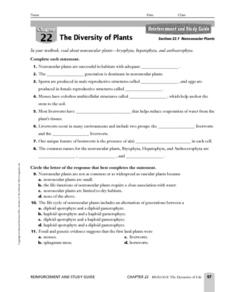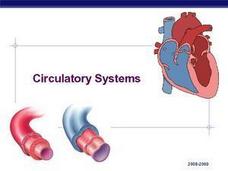Curated OER
Viruses and Bacteria
Reviewing the key terms and ideas from a chapter about viruses and bacteria, this activity helps students to reinforce their knowledge about the makeup and life cycle of a virus. Students answer true/false questions, blanks from a word...
Curated OER
The Human Body
For this human body worksheet, students will review the characteristics of the body systems: skeletal, circulatory, muscular, digestive, urinary, endocrine, reproductive, lymphatic, and respiratory systems. This worksheet has 12 fill in...
Curated OER
The Diversity of Fungi
In this fungi learning exercise, students will review the growth and reproduction of zygomycetes and the characteristics of ascomycotes, basidiomycotes, and deuteromycotes. This learning exercise has 15 fill in the blank, 4 short answer,...
Curated OER
Activities of the Immune System (Activity 1)
Students cut an apple in half and cover half with plastic wrap. They place drops of liquid on each half and discover how our skin protects us. They answer discussion questions to end the lesson.
Curated OER
The Life Cycle of a Flowering Plant
In this flowering plant worksheet, students will review vocabulary words associated with the life cycle of flowering plants. This worksheet has 7 matching and 3 short answer questions.
Curated OER
Non-Seed Vascular Plants
In this non-seed vascular plant worksheet, students review the characteristics of sporophytes, lycophytes, sphenophytes, and pterophytes. This worksheet has 19 fill in the blank, 4 true or false, and 2 short answer questions.
Curated OER
Nonvascular Plants
In this nonvascular plant worksheet, students compare the characteristics of bryophyta, hepatophyta, and anthocerophyta. This worksheet has 8 fill in the blank and 3 multiple choice questions.
Curated OER
Bones: The Body's Support
In this bones activity, students compare the axial and the appendicular skeletons. Students also review the bone components. This activity has 6 matching, 8 short answer, 4 fill in the blank, and 6 true or false questions.
Curated OER
Life Cycles of Mosses, Ferns, and Conifers
In this plant life cycle worksheet, students compare the life cycles of mosses, ferns, and conifers. This worksheet has 15 fill in the blank and 10 short answer questions.
Curated OER
Ferns and Gymnosperms
For this plant worksheet, students review the different characteristics of ferns and gymnosperms. This worksheet has 12 fill in the blank questions.
Curated OER
Muscles and Motor Locomotion
This is a fabulous presentation which should reinforce all aspects of muscle construction on a gross anatomical and micro level. There are slides to help understanding with the muscle fiber anatomy, and many labelled diagrams to explain...
Curated OER
Circulatory Systems
A slideshow that covers the all-important details related to basic human circulation. The reasoning for exchange of material methods is presented and then labeled diagrams of the main human transfer systems are shown, along with...
Cornell University
Shedding a "Little" Light on Cancer Surgery
Many types of cancer treatments now depend on nanotechnology—a big "little" discovery. Scholars begin by removing "malignant" tissue from simulated brains, one using fluorescent markers thanks to nanotechnology and one without. This...
Curated OER
Lipids: Fats and Oils
A fantastic presentation with great images should improve student understanding of lipids and their involvement in the body. The chemistry of different fats, phospholipids, and steroids are explained. Additionally, the specific uses,...
Curated OER
Metabolism & Enzymes
More extensive than just a general overview of digestion and reactions, this slide show gives information about all areas of enzyme function. Topics like the chemistry behind efficiency of enzymes, factors that affect speed of reaction,...
Curated OER
Transport in Plants
Quite a detailed and advanced look at the transport mechanisms of a plant. The absorption and control of sugar and water concentration are explained and will help an understanding of homeostasis concepts and organ specialization.
Curated OER
Organ Systems
Students examine organisms that are composed of tissues, organs, and systems. They dissect a fetal pig and explore the assigned organs systems such as the skeletal, muscular, and circulatory organs. Students identify and explain their...
Serendip
From Gene to Protein via Transcription and Translation
DNA carries the codes for creating just the right protein. A well-designed lesson leads pupils through the process from start to finish and everywhere in between. Guiding questions with supporting video help scholars understand the...
Curated OER
Semipermeable Membranes and Bioaccumulation
Beginning biologists place a drop of food coloring into water of differing temperatures to observe the effect on the diffusion rate. They remove the shells from raw eggs and then experiment with osmosis over the remaining membranes....
Curated OER
Genetically Modified Organisms
High Schoolers complete a variety of activities as they examine the ethics of (and take a position concerning) genetically modified organisms in the field of agriculture. They complete a PowerPoint demonstration to go along with the unit.
Atkins
Attack of the Viruses!
Not all viruses are bad, but are all retroviruses groovy? The lesson starts with a detailed presentation before scholars create their own model of a virus. The resource incorporates many worksheets and practice questions to reinforce the...
NOAA
Individual Species in the Deep Sea
A tube worm's outer covering is made of chitin, the same material that makes up the shells of lobsters and crabs. Scholars create tube worms and analyze and discuss the longevity of organisms living near cold seeps. They then discuss and...
Biology Junction
Protein Synthesis
Watson and Crick built the first model of DNA in the 1950s, and our understanding of DNA since then continues to grow exponentially. Scholars learn about protein synthesis by observing a presentation and completing a worksheet. Both walk...
Curated OER
Creative Ways To Teach Evolutionary Concepts
Research how DNA, the genetic blueprint of living organisms, plays an essential role in the continuity of life. High schoolers will summarize how their influence may very well effect the destiny of the population from one generation to...

























